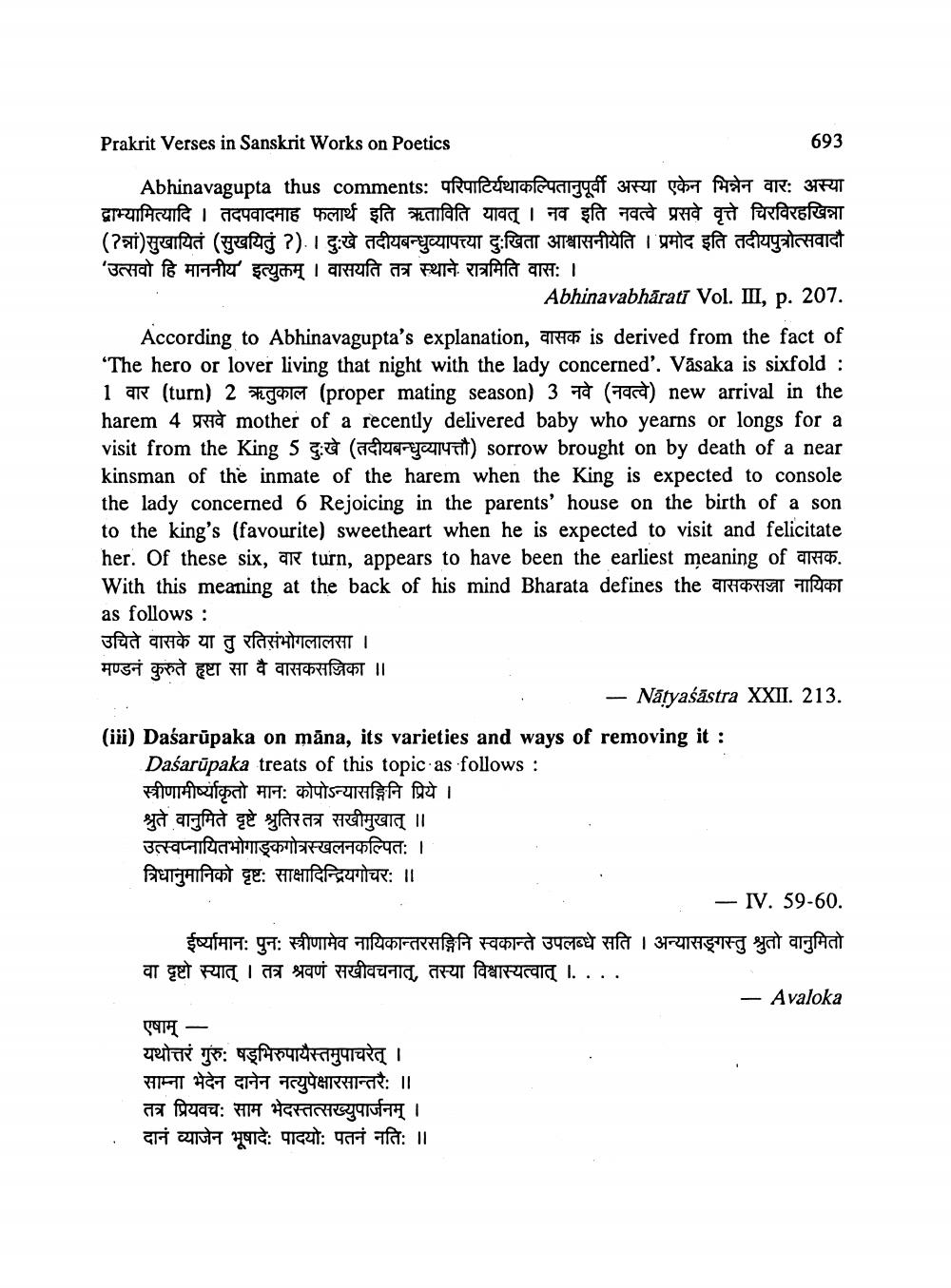________________
Prakrit Verses in Sanskrit Works on Poetics
693
Abhinavagupta thus comments: परिपाटिर्यथाकल्पितानुपूर्वी अस्या एकेन भिन्नेन वारः अस्या द्वाभ्यामित्यादि । तदपवादमाह फलार्थ इति ऋताविति यावत् । नव इति नवत्वे प्रसवे वृत्ते चिरविरहखिन्ना (7न्नां)सुखायितं (सुखयितुं ?). । दु:खे तदीयबन्धुव्यापत्त्या दुःखिता आश्वासनीयेति । प्रमोद इति तदीयपुत्रोत्सवादौ 'उत्सवो हि माननीय' इत्युक्तम् । वासयति तत्र स्थाने. रात्रमिति वास: ।
Abhinavabhārati Vol. III, p. 207. According to Abhinavagupta's explanation, ach is derived from the fact of “The hero or lover living that night with the lady concerned'. Vāsaka is sixfold : 1 वार (turn) 2 ऋतुकाल (proper mating season) 3 नवे (नवत्वे) new arrival in the harem 4 wd mother of a recently delivered baby who yearns or longs for a visit from the King 5 दुःखें (तदीयबन्धुव्यापत्ती) sorrow brought on by death of a near kinsman of the inmate of the harem when the King is expected to console the lady concerned 6 Rejoicing in the parents' house on the birth of a son to the king's (favourite) sweetheart when he is expected to visit and felicitate her. Of these six, वार turn, appears to have been the earliest meaning of वासक.
With this meaning at the back of his mind Bharata defines the वासकसज्जा नायिका as follows: उचिते वासके या तु रतिसंभोगलालसा । मण्डनं कुरुते हृष्टा सा वै वासकसज्जिका ।।
- Natyasastra XXII. 213. (iii) Dasarupaka on māna, its varieties and ways of removing it :
Dasarupaka treats of this topic as follows : स्त्रीणामीाकृतो मान: कोपोऽन्यासङ्गिनि प्रिये । श्रुते वानुमिते दृष्टे श्रुतिस्तत्र सखीमुखात् ।। उत्स्वप्नायितभोगाङ्कगोत्रस्खलनकल्पितः । त्रिधानुमानिको दृष्ट: साक्षादिन्द्रियगोचरः ।।
- IV. 59-60. ईर्ष्यामान: पुन: स्त्रीणामेव नायिकान्तरसङ्गिनि स्वकान्ते उपलब्धे सति । अन्यासगस्तु श्रुतो वानुमितो वा दृष्टो स्यात् । तत्र श्रवणं सखीवचनात्, तस्या विश्वास्यत्वात् I. . . .
-Avaloka एषाम् - यथोत्तरं गुरु: षड्भिरुपायैस्तमुपाचरेत् । साम्ना भेदेन दानेन नत्युपेक्षारसान्तरैः ।। तत्र प्रियवच: साम भेदस्तत्सख्युपार्जनम् । दानं व्याजेन भूषादे: पादयोः पतनं नति: ॥




